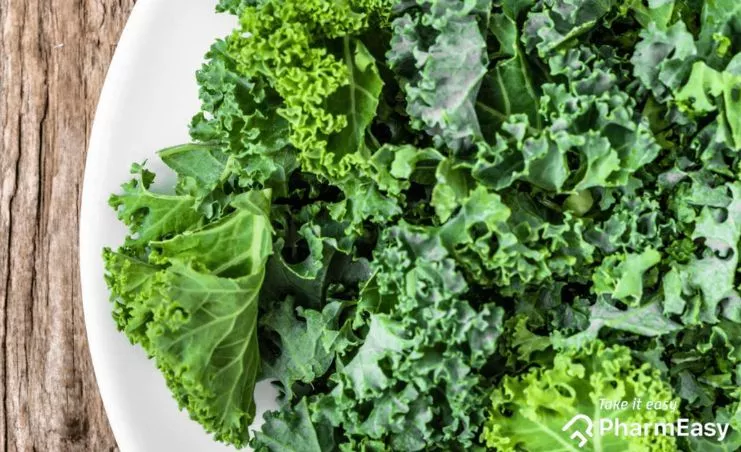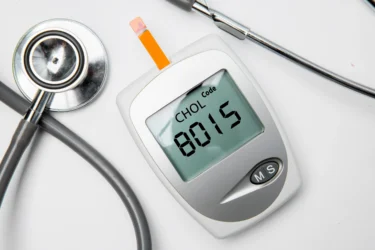Kale: Uses, Benefits, Side Effects By Dr. Smita Barode
By Dr Smita Barode +2 more

Get,

to manage your symptom
Get your,


4 Cr+ families
benefitted

OTP sent to 9988776655



You’ve successfully subscribed to receive
doctor-approved tips on
Whatsapp

Get ready to feel your best.

Hi There,
Download the PharmEasy App now!!


Register to Avail the Offer
Send OTPBy continuing, you agree with our Privacy Policy and Terms and Conditions

Hi There,
Sign up on PharmEasy now!!
Trusted by 4 crore+ families

OTP sent to 9988776655



You have unlocked 25% off on medicines




Code: NU25

Comments


Leave your comment here
By Dr Smita Barode +2 more
Table of Contents
Kale, also called “the queen of vegetables”, has received celebrity status by appearing on the menus of Michelin-star restaurants. In addition, it has become the favourite ingredient of many millennial food bloggers. Brassica oleracea or kale is a cruciferous winter vegetable available in different varieties like curly kale, dinosaur kale (lacinato kale), and Russian kale, also called Siberian kale. Curly kale is the most common of all; the leaves of kale look like ruffles, are purple or deep red and have a pungent taste. Originating in the 16th century in North America and later spreading to Canada and the U.S. In India, the cultivation of kale is limited to Jammu and Kashmir, Himachal Pradesh and the Nilgiri hills. Kale is one of the healthiest foods, the perks of which have been mentioned in several books by Greek physicians and botanists. There are several reasons to add this vegetable to your diet. Let us find out more about the benefits of kale1.

Did you know?
Kale is a nutritional powerhouse; it is packed with the goodness of fibres, minerals and antioxidants like zeaxanthin and lutein, folate, tocopherols and other phytoconstituents like nitrates, sulforaphane, insole-3-carbinol, etc. The nutritional components of kale are mentioned in the table below.
The consumption of kale shows numerous scientifically proven properties; some of these properties are mentioned below:
Some of the potential benefits of kale are described as follows:

Literature suggests that consuming green leafy vegetables may have a protective effect towards cognitive decline. Morris et al. conducted a study3 in 2018 to assess the effect of the consumption of green leafy vegetables like kale on cognition. This study showed that kale consumption might help slow down age-related cognitive decline due to bioactive phytochemicals like lutein, folate, nitrate, tocopherols, etc. This indicates that the consumption of kale may have a positive impact on cognition. However, we need more studies to support these claims.

Royston et al. conducted a literature review in 2015 to assess the impact of cruciferous vegetables on cancer prevention4. The findings of this review conclude that cruciferous vegetables like kale contain chemical components like insole-3-carbinol (I3C), sulforaphane (SFN) which are regulators of microRNAs (miRNAs) and inhibitors of DNA methyltransferases (DNMTs) and histone deacetylases (HDACs) and may be helpful in chemoprevention. This indicates that the consumption of kale may positively impact chemoprevention. However, we need more studies to support these claims.

Scientific studies have supported vegetarian diets, especially green leafy vegetables, for glycemic control. Sumio et al. conducted a study5 in 2016 to assess the effect of kale intake on plasma glucose. This study’s findings showed that kale intake might help suppress blood glucose levels. This indicates that kale consumption may help manage blood glucose levels. However, we need more studies to support these claims.

Literature states that cruciferous vegetables like kale have a positive impact on the composition and health of gut microbiota (microorganisms in the gut). Shahinozzaman et al. conducted a study6 in 2021 to assess the impact of kale supplementation on gut health in mice. This study’s findings suggest that kale consumption may help improve gut microbial composition, bacterial microbial functions and, thus, gut health. This indicates that the consumption of kale may have a positive impact on gut health. However, there are no studies conducted on humans to support these claims.

Hypercholesterolemia is defined as an increase in total cholesterol, an increase in LDL (low-density lipoprotein) and a reduction in HDL (high-density lipoprotein). Consumption of kale exerts a hypo-cholesterolaemic effect by HMG-CoA inhibition, the enzyme responsible for cholesterol synthesis. To evaluate the effect of kale supplementation in diet on lipid profile, Yeon et al. conducted a study7 in 2008 on hypercholesterolemia. The findings of this study showed that kale supplementation helped increase high-density lipoprotein or good cholesterol and decreased low-density lipoprotein or bad cholesterol. This indicates that the consumption of kale may have a favourable impact on lipid profile by inhibiting HMG-CoA. However, we need more studies to ascertain these claims.

Though there are studies that show the benefits of kale in various conditions, these are insufficient, and there is a need for further studies to establish the true extent of the benefits of kale on human health.
I personally believe that kale is only nutritious but may also support your efforts to maintain a healthy weight. This leafy green vegetable is low in calories and high in fibre and protein. A mere two cups (500 mL) of raw kale have fewer than 50 calories and 4.5g of protein and fibre. This means you might enjoy a satisfying portion of kale without consuming excessive calories, making it a great choice for those looking to manage their weight while nourishing their bodies8.
Dr. Siddharth Gupta, B.A.M.S, M.D (Ayu)
You must consult a qualified doctor before taking any herbal supplements. Do not discontinue or replace an ongoing treatment of modern medicine with an ayurvedic/herbal preparation without consulting a qualified doctor.
In light of what I’ve observed, incorporating kale into your diet might be a tasty way to potentially safeguard against certain health issues. Kale might be effective in binding bile acids in the body. This unique property of kale may contribute to reducing the risk of premature degenerative diseases. By helping to bind bile acids, kale may have a positive impact on your health, potentially lowering the risk of certain conditions9.
Dr. Rajeev Singh, BAMS
A study7 conducted by Alfawaz et al. in 2021 emphasized the following facts:
However, if you experience any adverse reactions to kale, it is advised to discontinue its intake and immediately contact a doctor or your Ayurvedic physician who has prescribed it. They will be able to guide you appropriately for your symptoms.
Judging from what I’ve witnessed, kale is a surprising vegetable that is packed with vitamin C. In fact, it might have a higher concentration of vitamin C compared to other salad vegetables and even vegetables from the Brassicaceae family. It might be considered one of the best sources of vitamin C and may meet the recommended daily allowance (RDA) for both males and females10.
Dr. Smita Barode, B.A.M.S, M.S.
Eating kale is okay if taken in moderate amounts. However, general precautions must be followed in the following conditions:
Also Read: Soybean: Uses, Benefits, Side Effects By Dr. Rajeev Singh
There is no significant interaction of kale with other drugs. However, you must always seek the advice of your Ayurvedic physician about the possible interaction of kale with other drugs and follow the prescription thoroughly, as they will know your health condition and other medications you are taking.
Also Read: Lettuce (Salad Patta): Uses, Benefits, Side Effects By Dr. Rajeev Singh
The scientific name of kale is Brassica oleracea1.
Yes. Kale contains low levels of carbohydrates, is rich in fiber and may help in promoting weight loss. However, scientific evidence to support this claim is limited. Therefore, you should consult a doctor if you have any weight-related issues.
Yes, kale may help manage diabetes as they have the potential to reduce elevated blood glucose. However, further studies are needed to support these claims. Therefore, it is advised to consult a doctor for the proper treatment of diabetes3.
Kale is known as “the queen of vegetables”1.
Consumption of kale in excess can increase the risk of kidney stones, and iodine deficiency and can trigger an allergic reaction in allergy-prone individuals.
Disclaimer: The information provided here is for educational/awareness purposes only and is not intended to be a substitute for medical treatment by a healthcare professional and should not be relied upon to diagnose or treat any medical condition. The reader should consult a registered medical practitioner to determine the appropriateness of the information and before consuming any medication. PharmEasy does not provide any guarantee or warranty (express or implied) regarding the accuracy, adequacy, completeness, legality, reliability or usefulness of the information; and disclaims any liability arising thereof.
Links and product recommendations in the information provided here are advertisements of third-party products available on the website. PharmEasy does not make any representation on the accuracy or suitability of such products/services. Advertisements do not influence the editorial decisions or content. The information in this blog is subject to change without notice. The authors and administrators reserve the right to modify, add, or remove content without notification. It is your responsibility to review this disclaimer regularly for any changes.
Comments

Leave your comment...

View all comments(1)
You may also like
Great useful well written article!